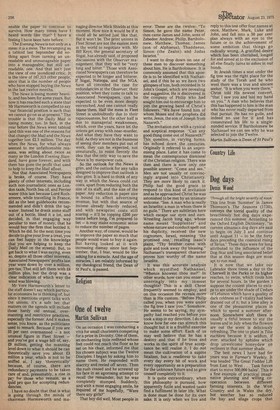Religion
One of twelve
Martin Sullivan
On an occasion I was conducting a viva for small choristers competing for a prize in Divinity. One of them, an enchanting little redhead whose feet could not reach the floor as he sat on his chair, informed me that his chosen subject was the Twelve Disciples. I began by asking him to name them. He responded with alacrity and reeled off seven. Then the rush ceased and he screwed up his face in an agonising attempt to recall the remainder, but he was completely stumped. Suddenly, and with a most engaging smile, he inquired of me hopefully, "Were there any girls?"
That boy did well. Most people in error. These are the twelve: "To Simon, he gave the name Peter, then came James and John, sons of Zebedee: Andrew, Philip, Bartholomew, Matthew, Thomas, James (son of Alphaeus), Thaddaeus, Simon (the Zealot) and Judas Iscariot."
I want to drop down on one of these men to discover something about him. He is Bartholomew. It is commonly assumed that this apostle is to be identified with Nathanael, and if this be so we have two glimpses of him, both recorded in St John's Gospel, which are revealing and suggestive. He is discovered in the company of Philip who had sought him out to encourage him to join the growing band of Christ's followers. "We have found him of whom Moses and the prophets did write, Jesus, the son of Joseph from Nazareth."
The invitation met with a cynical and sceptical response. "Can any good thing come out of Nazareth?" This question, in varying forms, has echoed down the centuries. Originally it referred to an unpromising place. Later it has come to mean the contemptuous dismissal of the Christian religion. There was then and there is now only one possible answer: "Come and see." Men are not usually or convincingly argued into Christianity. They are more likely to catch it. Philip had the good grac-e to respond to this kind of invitation and as he approached Christ he was astonished to be met by an intimate welcome. "See. A man who is really an Israelite; a man in whom there is no guile." There are subtleties here which escape our eyes and ears. Wrestling Jacob long ago, whose name meant 'Supplanter' and whose nature and conduct spelt out his duplicity, received the new cognomen, Israel, meaning the promised one,' recalling Isaac's plaint, "Thy brother came with guile and took away thy blessing." Nathanael's transparent character proves him worthy of the name Israelite.
It was this accurate analysis which mystified Nathanael, "Wkience knowest thou me?" In other words, how can you enter so unerringly into my inmost thoughts? This is a skill Christ frequently seemed to employ, and on this occasion He reveals more than is His custom. "Before Philip called you, when you were under the fig tree I saw you." Somehow, He seems to be saying, my sympathy had reached you before you took a step in my direction. I do not know how far one can stretch this thought but it is a fruitful exercise to make some effort. Each of us may well believe that be has a destiny and that if he lives and works in the spirit of true acceptance he will realise it. I do not mean the cultivation of a supine fatalism, but a readiness to take every day every bit of work and every opportunity as a preparation for the unknown future and to give oneself completely to it.
It is quite extraordinary, when this philosophy is pursued, how apparently futile and wasted tasks find a fulfilment in later life. What is done must be done for its own sake. It is only when we live and
reply to this test offer four names at once, Matthew, Mark, Luke and John, and fall into a 50 per cent plan always with an eye to the future or to the achievement of some ambition that things go radically wrong. A gratified desire which has been cherished, longed for and aimed at to the exclusion of all else finally turns to ashes in our hands.
In Jewish times a seat under the fig tree was the right place for the study of the Torah and he who went there was a true and sincere seeker. "It is when you were there," Christ told His newest convert, "that I saw you and laid my hand on ydu." A man who believes that this has happened to him is the man who has never really departed from that pursuit. He has no guile, and indeed no use for it and has consecrated his life to a single.minded service. If Bartholomew be Nathanael we can see why he was selected to join the Twelve.
Martin Sullivan is Dean of St Paul's


































 Previous page
Previous page